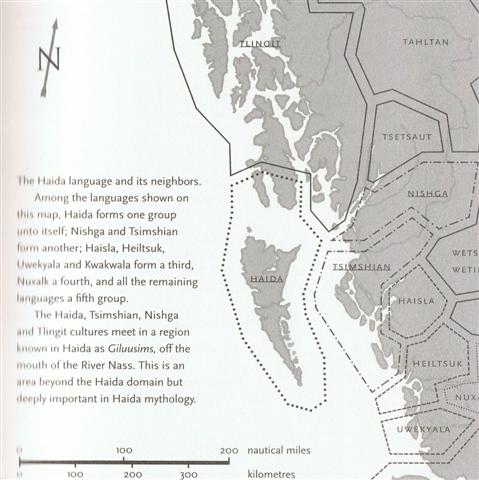6. To find a proper name for the 'midnight henua' I used Metoro's readings, the first level above the texts themselves:
In order to support my choice of the label raaraa I can then refer to a useful myth in Robert Bringhurst's A Story as Sharp as a Knife. The Classical Haida Mythtellers and Their World: "In the morning of the world, there was nothing but water. The Loon was calling, and the old man who at that time bore the Raven's name, Nangkilstlas, asked her why. 'The gods are homeless', the Loon replied. 'I'll see to it', said the old man, without moving from the fire in his house on the floor of the sea. Then as the old man continued to lie by his fire, the Raven flew over the sea. The clouds broke. He flew upward, drove his beak into the sky and scrambled over the rim to the upper world. There he discovered a town, and in one of the houses a woman had just given birth. The Raven stole the skin and form of the newborn child. Then he began to cry for solid food, but he was offered only mother's milk. That night, he passed through the town stealing an eye from each inhabitant. Back in his foster parents' house, he roasted the eyes in the coals and ate them, laughing. Then he returned to his cradle, full and warm. He had not seen the old woman watching him from the corner - the one who never slept and who never moved because she was stone from the waist down. Next morning, amid the wailing that engulfed the town, she told what she had seen. The one-eyed people of the sky dressed in their dancing clothes, paddled the child out to mid-heaven in their canoe and pitched him over the side. He turned round and round to the right as he fell from the sky back to the water. Still in his cradle, he floated on the sea. Then he bumped against something solid. 'Your illustrious grandfather asks you in', said a voice. The Raven saw nothing. He heard the same voice again, and then again, but still he saw nothing but water. Then he peered through the hole in his marten-skin blanket. Beside him was a grebe. 'Your illustrious grandfather asks you in', said the grebe and dived. Level with the waves beside him, the Raven discovered the top of a housepole made of stone. He untied himself from his cradle and climbed down the pole to the lowermost figure. Hala qaattsi ttakkin-gha, a voice said: 'Come inside, my grandson.' Behind the fire, at the rear of the house, was an old man white as a gull. 'I have something to lend you', said the old man. 'I have something to tell you as well. Dii hau dang iiji: I am you.' Slender bluegreen things with wings were moving between the screens at the back of the house. Waa'asing dang iiji, said the old man again: 'That also is you.' The old man gave the Raven two small sticks, like gambling sticks, one black, one multicoloured. He gave him instructions to bite them apart in a certain way and told him to spit the pieces at one another on the surface of the sea. The Raven climbed back up the pole, where he promptly did things backwards, just to see if something interesting would occur, and the pieces bounced apart. It may well be some bits were lost. But when he gathered what he could and tried again - and this time followed the instructions he had been given - the pieces stuck and rumpled and grew to become the mainland and Haida Gwaii." The map below shows where the myth was told, on the northwest coast of America:
|
|||||||||||||||||||||||||||||||||||||||||||||||||||||||||||
